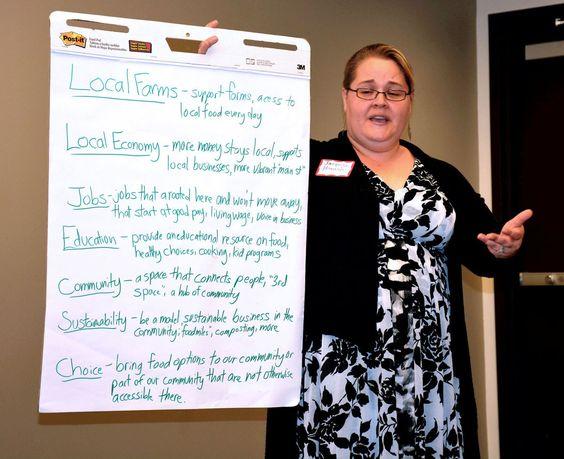Effingham Hears Benefits of Proposed Food Cooperative

Egg and cattle producer Paula Rohwedder of rural Altamont was among the approximately 40 people who attended a meeting this week about organizing a local food cooperative, which she thinks might create bigger market for her free-range eggs.
"If a co-op would be established here, we would have a place for our eggs to go," she said.
Connie Nosbisch, who also attended the meeting, might be one of her customers at the co-op.
"I believe in supporting local farms," said Nosbisch, of Effingham. "It would be nice for them to have a place to sell."
Food cooperatives, or co-ops, have been around for a long time — more than 70 years in some cases.
In the past, they were typically associated with large college towns, where larger numbers of people were concerned about the safety of their food supply. Those co-ops emphasized the concept of organically produced food.
But the main speaker at an organizational meeting for the proposed co-op in Effingham said co-ops can be found anywhere, from major cities to towns much smaller than Effingham.
Jacqueline Hannah, former general manager of the Common Grounds co-op in Urbana and now a consultant for the Food Co-Op Initiative, told the approximately 40 people at this week's meeting at Effingham Public Library that organizing a co-op is not easy. But she added that the rewards can be immense.
"Co-ops stimulate local business and add jobs," Hannah said. "But is it easy to build a co-op? No. It takes a lot of money and it's not simple at all."
"But it is rewarding, impactful and worth it to many communities," she added.
Hannah led Common Grounds' transformation from a tiny church basement store to a much larger store at historic Lincoln Square in downtown Urbana. She said co-ops employ a unique business model. Neither a for-profit business nor eligible for 501c3 tax-exempt status, co-ops are governed by a standard under which no single shareholder gets more than one vote. Moreover, she said, any profit must be funneled back into the co-op.
"All profits must be reinvested in the business to better serve the community," Hannah said.
In the end, the successful co-op will look similar to its competition in the for-profit grocery arena.
"Typically, co-ops have more local impact, better-paid employees and healthier foods," she said. "These are beautiful full-service grocery stores."
Some co-ops place an emphasis on nutrition education, while others focus on access to previously underserved areas — often in depressed urban areas that haven't had grocery stores for many years.
Still others go out of their way to support local producers, while others emphasize sustainability through alternative energy sources, such as solar and wind.
"There's usually a unique reason for each co-op," she said.
Hannah said the first step is to determine whether the Effingham area is ripe for a cooperative grocery.
"I can't decide whether it's worth it for you," she said, adding that the process of developing a co-op generally takes from three to 10 years.
Hannah said the steps include organizing the group, determining feasibility, planning, pre-construction and construction — with a total cost anywhere from $1 to $4 million. She said co-ops have a 75 percent success rate.
Meeting organizer Joe Cooper, owner of Heartland Health Foods in Effingham, agreed with Hannah that co-op development does not happen overnight.
"It takes a lot of perseverance and effort to develop a co-op," Cooper said.
Sue Thoele of Dieterich said she attended the meeting this week for community health reasons.
"I'm interested in healthy people," Thoele said. "I am hoping to find people who lean more toward the organic foods."
The Effingham Daily News Oct 11, 2016
Effingham, Illinois
Writer Bill Grimes can be reached at [email protected] or 217-347-7151, x132.







